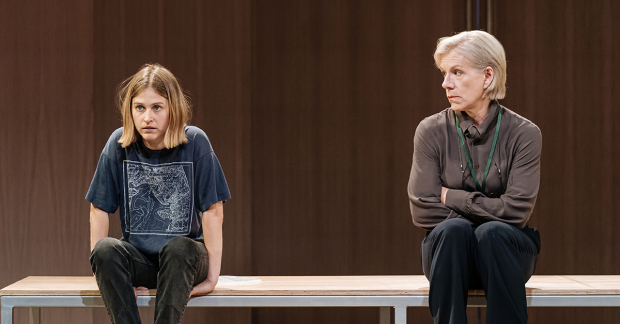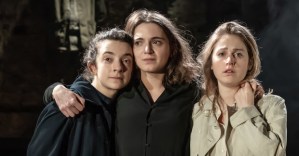Review: The Doctor (Almeida Theatre)
Robert Icke adapts and directs his final show as an associate director at the Almeida Theatre

© Manuel Harlan
What a clever director Robert Icke is! He ends his six years as associate director at the Almeida with a savagely brilliant version of an early 20th-century classic, which he has both translated from the German and transformed into a challengingly humane examination of many of the issues of our times.
It stands alongside his productions of the Oresteia, Mary Stuart, Hamlet and The Wild Duck at the same address for its clarity of purpose and its willingness to breathe new life into old plays, while never betraying their intention.
Here the text is provided by Professor Bernhardi, by Arthur Schnitzler, first produced in 1912, and controversial even then. Its subject is a Jewish doctor who refuses a priest admission to the bedside of a young woman who is dying of sepsis following a botched abortion. The doctor wants his patient to die in peace, without the knowledge of her death; the priest to forgive her mortal sin.
The collision between the rationalities of science and the sanctities of religion, between two types of comfort and care, between a Catholic and a Jew spins into a huge scandal. Icke, pulling the play into the contemporary world, has made the doctor a woman, Ruth Wolff – known by her cynically conspiring male colleagues as BB, as in big bad – and she is played by his regular collaborator Juliet Stevenson with an upright, uptight belief in her own integrity, a quick wit and what another character calls her "trademark disdain."
Because she is a woman, the cycle of accusation that unfolds around her is complicated not only by anti-semitism (as in Schnitzler), but also by a heaving tangle of gender and identity politics. Icke has further complicated an already murky situation by casting his excellent actors against the descriptions of their characters; white actors play black characters, women play men. Some roles – such as Wolff's 'partner' Charlie – are deliberately left non-gender specific although he/she is tenderly embodied by Joy Richardson.
Because the priest is played by the white actor Paul Higgins, it completely pulls the rug out from your assumptions when it is revealed that he is black – and Wolff is herself accused herself of racism and unconscious bias. The ground of accusation is constantly shifting, and the only thing that is absolutely clear is that everything is political, and self-interest and ambition will always have a role to play even at an institute, like the one where Wolff works, that is supposedly devoted to the disinterested pursuit of finding a cure for dementia.
These themes are given a physical manifestation by Hildegard Bechtler's clinical set, with a table at the centre which sometimes revolves as the arguments unspool, creating a sense of an endless round of accusation and counter-charge. Icke resolutely refuses to give anyone a clear argument; in a world where everyone is totally sure of their opinions, his point is that nuance is all. Nothing is entirely black and white; everything shimmers in shades of gray. This is best illustrated by the terrible moment where – in order to preserve her integrity and make her case – Wolff betrays a teenager she has befriended. Our sympathies may be with her as she faces the court of public opinion, enduring a witch hunt ill-informed and inflamed by lies being spread on social media, but she is not without flaw.
Icke directs all this like a thriller; the air positively crackles with the difficulty of the raging debate. It is a play entirely made up of ethical argument, yet it is so tense there are moments when you stop breathing – or when someone's point of view seems so outrageous that it demands a sharp intake of breath. It can be uncomfortable but it's also fiercely funny. The electricity is increased by the sheer tautness of Icke's direction; the way the lights barely flicker at each revelation; the freeze-framing of moments of violence; the live score played on drums by Hannah Ledwidge.
The performances too are excellent, with Ria Zmitrowicz in particular gently and truthfully touching as Woolf's teenage friend and Naomi Wirthner positively terrifying as her odious rival. But it is Stevenson who towers over the evening. She barely leaves the stage, as she registers each moment of Woolf's decline from powerful leader, in charge of her world and her emotions, to the haunted and hunted tragic figure she becomes at the end of almost three hours. It's an astonishing, gripping evening – and a testimony to Icke's unparalleled ability to make theatre that you can't turn away from.



















